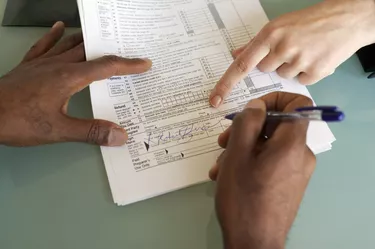
Many taxpayers are unaware of the federal government's Treasury Offset Program, which allows any state or federal agency to recover a debt by intercepting a taxpayer's income-tax refund. This action usually results in a garnishment of all or part of the refund, as well as a delay in processing the refund. Fortunately, taxpayers who discover that their refunds are in danger of being seized can take action to stop the garnishment.
Research
Video of the Day
First, contact the Internal Revenue Service to determine whether your account has been flagged for garnishment. The IRS will be able to inform you as to whether you have an IRS debt or a debt with another agency. The IRS will not, however, be able to tell you which government agency has flagged your future refunds for garnishment. To find this out, you'll need to call the Offset and Debt Division of the US Department of the Treasury's Bureau of Financial Management Service at (800) 304-3107.
Video of the Day
Stop the Garnishment
Once you've determined which government agency is set to garnish your refund, contact that government agency directly. If you owe a debt to a federal agency and it is not an error, set up payment arrangements with that agency. For example, many taxpayers have their refunds garnished by the US Department of Education because they defaulted on repayment of their student loans. But if taxpayers had resumed making timely payments on the student loan before the refund check was garnished, the garnishment would have been stopped. The number of payments that must be made before the garnishment can be removed varies from agency to agency, so contact each one.
If your refund has already been garnished by an agency other than the Treasury Department, the IRS probably cannot undo the garnishment. Usually, a garnishment can only be stopped before the refund is issued, not after.
There are certain exceptions in place for joint filers and taxpayers experiencing an economic hardship. For example, taxpayers who are on the verge of eviction or foreclosure may be able to recover all or a portion of their garnished refund by contacting the IRS's Taxpayer Advocate Service.
Garnishments for Joint Filers
If you are a joint filer and your refund was garnished because of your spouse's debt, IRS Form 8379, Injured Spouse Allocation, to recover your portion of the refund. This document can be downloaded at IRS.gov or requested by calling (800) 829-1040. The processing time for Form 8379 is usually between 11 and 14 weeks.
Economic Hardship
Taxpayers experiencing an economic hardship such as foreclosure or eviction should call the IRS's Taxpayer Advocate Service at (877) 777-4778 for additional assistance. This office provides free assistance to taxpayers who are having difficulty navigating the system and getting their claims resolved.